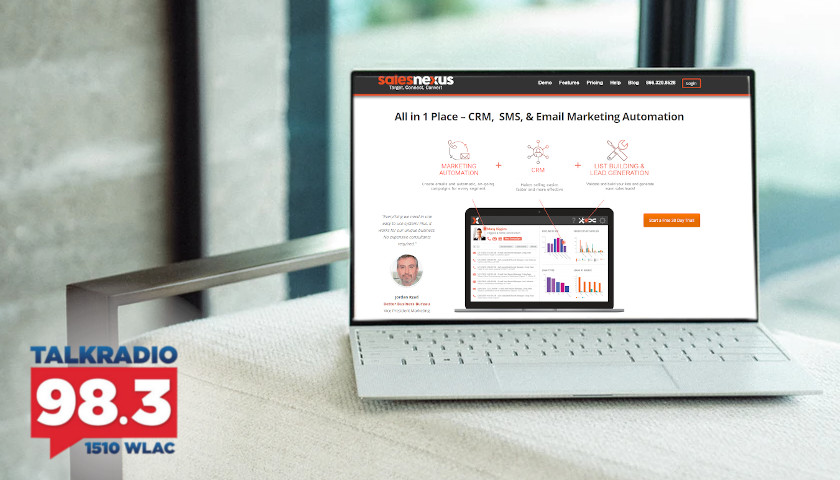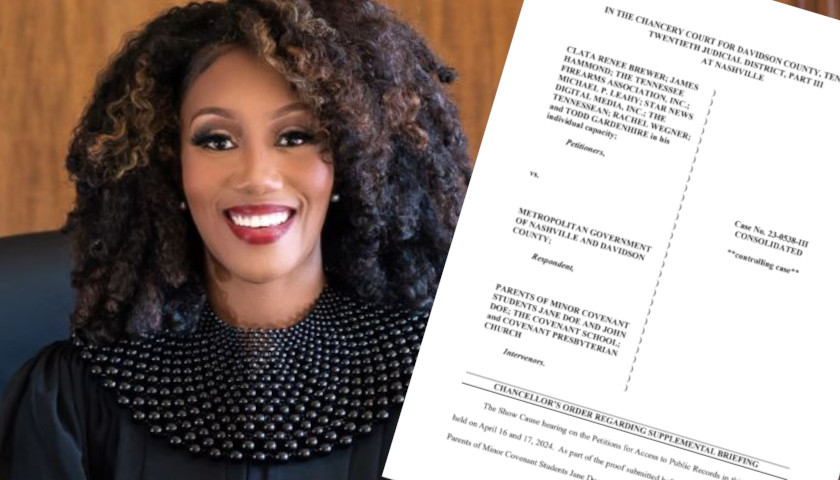Live from Music Row Wednesday morning on The Tennessee Star Report with Michael Patrick Leahy – broadcast on Nashville’s Talk Radio 98.3 and 1510 WLAC weekdays from 5:00 a.m. to 8:00 a.m. – host Leahy welcomed Craig Klein of Sales Nexus to describe his company’s services as a great alternative to the other Big Tech monopolies.
Leahy: In studio with us the original all-star panelist Crom Carmichael. Crom, good morning.
Carmichael: Michael, good morning, sir.
Leahy: Glad to have you here Crom. This is a great new segment that we’re launching here at The Tennessee Star Report. It is called the tech life series. We have searched the country for innovative entrepreneurs and businessmen who are going to give regular Americans alternatives to the Big Tech monopoly out there. And our first participant in the tech life series is our good friend Craig Klein founder of Sales Nexus on the web at SalesNexus.com in Houston, Texas. Welcome to The Tennessee Star Report, Craig.
Klein: Thank you very much, Mike. Thanks for having me on.
Leahy: Well, we’ve had some great conversations about alternatives to Big Tech and we want to break it down into one very specific area to start this off. If you’re in business out there right now and you want to do some online advertising one of the dominant players in this Google AdSense program. And I hear all the time from business people who feel well I have to advertise on Google AdSense.
Spend a couple of thousand or $3,000 a month because I don’t have any alternatives. but you know, they don’t really provide any response to me and I’m not really sure. If I have a problem I don’t hear from them. and then I’m not sure what the results are you and I were talking Craig and there is an alternative for businessmen. Businesswomen to Google AdSense. Tell us a little bit about the advice you would give a business person looking to get advertisement and to get business on the net who feel like they want to get away from Google AdSense.
Klein: We’ve been helping companies grow for over 15 years and I personally have spent a lot of money on Google AdSense, Ad Words, and all of their platforms over the years. And I’ve had those frustrations. and I’ve heard just countless businesses saying exactly what you said. You spend a lot of money and you’re really never sure how much you’re making. And it’s almost impossible to get help. You really end up needing to pay a separate consultant to help you figure it out.
Leahy: Yeah, and when you’ve got a problem with Google AdSense and you’re just doing it yourself and you try to get them to explain how they do things, you don’t get a response at all it seems like. We hear that all the time.
Klein: Right. Sales Nexus provides an alternative to that kind of marketing. From my perspective when I got into using Google and YouTube and all their different ad platforms the advantage that they offer and what’s appealing about it is the ability to really finally target your audience. Like I can say I want males between these ages that have this many kids and own a Corvette or whatever really specific stuff. Which is great. It allows me to kind of control my spending or at least that’s the idea. And so it’s that’s the question really. How do you find an alternative that gives you the ability to target like that but gives you real results and lets you see the results, right?
Leahy: So let’s say there’s a business out there and they’ve been stuck spending three thousand bucks a month on Google AdSense. They are not sure it’s getting results. Let’s say they sell products to a business for instance. They sell direct companies. They come to you and say hey Craig I’m tired of spending $3,000 a month on Google AdSense. What would you do for me?
Klein: Well, normally we can show them how they can spend maybe more like $500 or $1,000 and get better results. And so what it really comes down to is let’s go direct. Instead of going through a third party like Google or Facebook or whoever let’s go direct to the customer. Let’s build up a list of the customers that you want to target. Especially for businesses, it’s usually pretty straightforward.
You know you want to do business with people in this industry. And the person that you want to talk to is as this title. It’s pretty easy to come up with those criteria and then we can build a list of those people with their email address and their phone number and often their mobile phone number and their mailing address and lots of other contact information.
Leahy: Let’s stop just for a moment. So these email lists are out there and these texts are out there, you can help them by these lists and they are available to them in compliance with all the rules and regulations out there? Is that how it works?
Klein: The regulations are very different from country to country. So if you’re marketing in Europe or even Canada, it’s a little different. But in the U.S. the regulations are pretty liberal generally. So the key is you want to make sure you have an accurate address. There’s a lot of people out there scraping the web and they’ll give you a list.
Leahy: Well, let’s just stop for a minute. when you say scraping the web, explain to our audience what you mean by scraping the web for email addresses?
Klein: Well just the way Google has bots that go around and index the web for their search engine.
Leahy: Bots as in kind of robot operations?
Klein: Yes. That’s right. Just automated processes that are going around collecting all the data off of websites. And so there are companies that have these Bots that go through websites and collect the email addresses that are on your website. You might have an about us page that has all of your key executives and their contact information. Well, they can get those emails and put them into a list.
Which is fine except what happens when you do that is you end up with a lot of emails that are old, don’t work anymore, maybe that guy retired and he’s taken a new job at another company. And, when you send emails to a large list and a lot of those addresses are not good they bounce. Then your reputation is going to be damaged and you’re going to end up seeing a lot of your emails going to the junk folder.
Leahy: Also aren’t there rules and regulations about opt-in emails. tell us about that and how that works with this.
Klein: Again in the U.S. the regulations are pretty liberal. If you actually looked at the regulation at play here is called the Can Spam Act and you can look it up. It’s really short. It’s less than a page. And what it says basically is all you have to do is identify yourself clearly. Don’t pretend to be somebody else in other words and give the recipient an easy way to opt-out. That’s the law.
Leahy: That’s the key there. The unsubscribe at the bottom of an email. If a listener by the way is out there and you’re being bombarded with how do these guys start sending me an email? All you have to do is just hit the unsubscribe button at the bottom of the email.
Klein: Yeah, that’s right. So if you think about it, it’s really no different than direct mail. Go to your mailbox every day and you got a few postcards in there from Realtors or mortgage brokers or whoever that you’ve never met before. And email is the same way with the advantage of if you don’t want to get more of those postcards you hit the unsubscribe button.
The key is you want to get the list from a vendor that can validate those emails. So that’s what we do, is when you’re downloading your list we will actually check the mail server of that company and validate that the email address is valid. And so that means when you send your emails out, you’re going to get a very high delivery rate.
Leahy: So let me just use a theoretical example. Let’s say you’re in the business of providing wholesale flowers to florists out there. You’ve got a business. You’ve got a hothouse and you grow flowers. Your customers would be floral shops out there and you’ve been spending on Google AdSense to try to reach floral shops around the United States. and you call up and say hey, we don’t want to spend money with Google AdSense anymore. Specifically, what would be in that particular case what would you advise that kind of a company?
Klein: Well, obviously the first step is to build the list. And that wouldn’t be that difficult to build a list of florists based on the industry and the name of the company and things like that. And then the second thing is you want to send an email that’s not just a sales pitch, right? You just don’t want to show up in their inbox. I don’t know you from Adam and here I want you to buy something from me.
Leahy: By the way Craig, I’ve received plenty of those kinds of emails. Do you know what I do with them?
Klein: You delete them.
Leahy: I delete them and if I’m really irritated I click on spam and I unsubscribe.
Klein: Exactly and you don’t want that right? That’s the worst thing that could happen because in a way if you think about it your first email to these people is analogous to 20 years ago you had a salesperson that would knock on the front door and walk in and shake their hand right and introduce themselves.
Listen to the full second hour here:
– – –
Tune in weekdays from 5:00 – 8:00 a.m. to the Tennessee Star Report with Michael Patrick Leahy on Talk Radio 98.3 FM WLAC 1510. Listen online at iHeart Radio.








